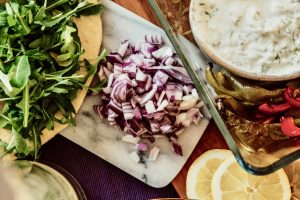Strengthening Immunity During the Covid-19 Crisis

Hi everyone, my name is Sue Camp and I lead the Nutrition Team for the HealthMatters Group.
We wanted to collate some useful information for immune support at this time.
This information is not about treating any viral infection, but rather about supporting our immunity with the aim of being as resilient as possible should we come into contact with the virus or other bugs.
Coronaviruses (CoV) are a large family of viruses that cause a range of illnesses. Common signs of infection include respiratory symptoms, fever, cough, shortness of breath and breathing difficulties. In more severe cases, infection can cause pneumonia, severe acute respiratory syndrome, kidney failure and even death. COVID-19 is the most recently identified disease caused by the SARS-Cov-2 form of coronavirus.
As has been stated in the media, most individuals infected with the virus may only experience mild symptoms, and will make a full recovery. However, there is an increased risk for the elderly, those with underlying health conditions and immune-compromised people. Self-isolation, social distancing and diligent hygiene are all essential methods to help avoid infection as well as help to prevent the spread of the virus. Individuals with a robust immune system are more likely to experience milder symptoms and recover more quickly. Therefore, interventions which can help to support normal immune function can be a useful way of helping to protect your own health.
We wanted to spend some time chatting about how viruses infect the body and how we can strengthen our immune system.
Viruses enter the body from the environment through the respiratory tract, eyes or breaks in the skin and attach to a host cell. They then inject their genetic material into the cell where it can replicate and produce more viruses which then break free and go on to infect other cells. This is known as the lytic cycle.
The immune system is a very complex network of cells and proteins and provides the body’s defence mechanism against infections and viruses. The immune system has a number of responses to fend off these viruses and are essential in stopping the lytic cycle and dealing with the infected cells:
- Cytotoxic T-cells kill other cells that are infected with viruses using toxic mediators.
- Natural Killer cells provide a back-up plan when needed by releasing toxic substances to kill infected cells.
- The infected cells can also release molecules called cytokines which signal neighbouring cells to enhance killing mechanisms and stimulate apoptosis or the death of the cell.
- Antibodies are produced following infection. Viruses that are bound to antibodies are unable to infect the cells .
So how do we help these friendly cells to fight the invading virus? First strategy is always dietary.
Research indicates that brightly coloured vegetables and fruits strengthen immunity better than most supplements. Eat plenty of fruits and vegetables—aim for 10 servings per day.
Targeted supplements can provide useful additional support.
Vitamin C – supports the body’s defence system by enhancing white blood cell function and activity. Regularly administered vitamin C has been shown to shorten the duration of colds, and higher doses of vitamin C during an illness can also act as a natural antihistamine and anti-inflammatory.
Starting with food, we often think of citrus fruits as the best sources, and oranges, limes and lemons are definitely on the list. Other fruits include strawberries, kiwis, papaya, guavas, persimmons and lychees, and vegetables to include are broccoli, Brussels sprouts, kale, yellow peppers as well as herbs such as thyme and parsley.
Zinc supports the body’s natural defence system too. Zinc can help to reduce the frequency of infections as well as the duration and severity of the common cold when taken within 24 hours of onset.
Oysters, red meat, shellfish and poultry are excellent sources of zinc. Vegetarian options include legumes such as chickpeas, lentils and beans, seeds such as hemp, pumpkin and sesame, as well as nuts including cashews and almonds. Cheese and milk also contain zinc.
Vitamin D – vitamin D receptors are found on a number of immune cells, including lymphocytes and macrophages, supporting healthy immune cell activation.
Food sources include fatty fish such as tuna, mackerel, salmon, herring and sardines as well as cheese, egg yolks, mushrooms and fortified foods such as milk and some cereals.
Vitamin A – extremely helpful in supporting the body’s ability to fight infections, particularly with regard to respiratory infections. It also supports healthy maintenance of mucous membranes
You can find vitamin A in cod liver oil, beef liver, eggs, fortified milk and cereals. Other sources include orange and yellow fruits and vegetables, as well as broccoli, spinach and most dark green, leafy vegetables.
Selenium supports antioxidant defences, immune function and cellular health. You can obtain selenium from Brazil nuts, fish and shellfish and some enriched foods like breads and cereals.
Probiotics contain “good bacteria” that not only support the health of the gut but also influence immune system functioning and regulation. Studies have shown that probiotic use can decrease the number of respiratory infections, particularly in children.
They can be found in fermented foods such as sauerkraut, fermented tempeh (type of soya), miso, kefir and natural yogurt.
Beta-glucans are important structural components of cell walls in certain organisms such as bacteria, fungi and some plants. They can help to upregulate the immune system.
Food sources include reishi, maitake and shiitake mushrooms as well as oats, whole grains, seaweed and algae.
Garlic contains a variety of compounds that can influence immunity. Some studies have shown that both fresh garlic as well as aged garlic extract and some other garlic supplements may reduce viral upper respiratory infection severity as well as helping in the prevention of infection with viruses that can cause colds.
There are behavioural prevention strategies:
- Handwashing of course – ideally with an alcohol-based hand sanitiser that contains at least 60% alcohol.
- Cover your mouth and nose with a tissue when coughing or sneezing
- Avoid touching your eyes, nose, and mouth with unwashed hands, which can help provide the virus with a route of entry into the body. Since the average individual touches their face an average of 15 times per hour, remain vigilant!
- Clean and disinfect frequently touched surfaces, especially when someone is ill. Surfaces to consider include doorknobs, phones, computer keyboards, remotes, and other surfaces that are frequently touched in rooms such as the bathroom and kitchen.
And more specifically, when battling upper respiratory infections, top priorities are:
- Stay well hydrated – homemade vegetable or bone broths, herbal teas and hot drinks such as peppermint, ginger, eucalyptus, chamomile, and hot water with lemon, honey, and cinnamon.
- Salt water gargles are excellent for loosening mucus and helping fend off bacterial throat infections.
- For respiratory congestion, use a humidifier, vaporizer, or steam inhaler or spend time in steamy baths or showers. Vaporizers and inhalers can also be used with decongestants or essential oils such as eucalyptus, menthol, peppermint, or frankincense
Lifestyle routines, too, are a crucial part of supporting immunity:
- Chronic stress can negatively alter immune system responses, making you more likely to get sick. Identify your personal stress reduction strategies and practice them regularly.
- Sleep has a big influence on immune function, so it is essential to get plenty of sleep.
- Moderate, regular physical activity helps to boost immune system function by raising levels of infection-fighting white blood cells and antibodies, increasing circulation, and decreasing stress hormones.
Our suggestion is to take this time to increase your immune system strength, work on your physical health, balance your emotional health and to stop those health sabotaging habits.
Take time to connect with family, friends and even your pets. Make that call to a friend or family member you just haven’t found the time to connect with lately. Or maybe even write a letter.
Do you remember saying, “if I just had some time and the world would slow down, I would……
Let’s aim to make some dreams come true instead of the virus trying to crush our dreams.
We have the power to change our perceptions.
This is an opportunity to make impactful health changes in our lives.
ONLINE NUTRITIONIST COACHING
Learn more about Health and Wellbeing
Here are some articles and blogs about health and wellbeing



